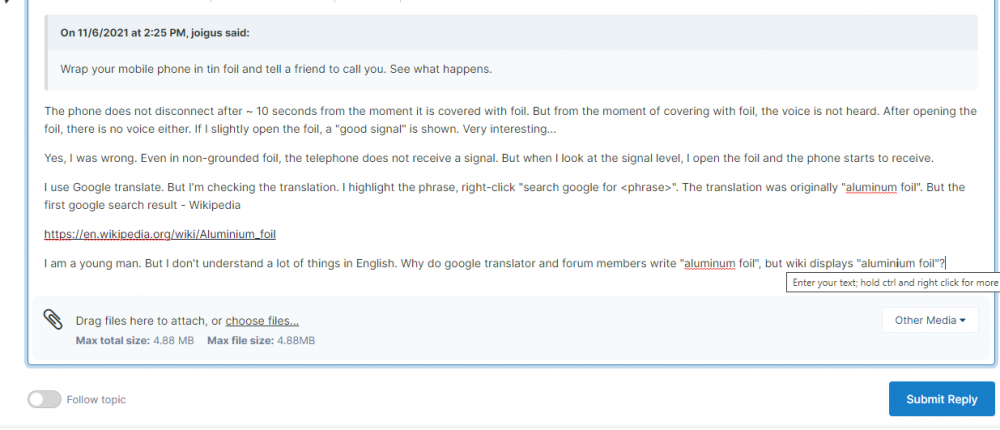Everything posted by dyachmen
-
Could this be
The phone does not disconnect after ~ 10 seconds from the moment it is covered with foil. But from the moment of covering with foil, the voice is not heard. After opening the foil, there is no voice either. If I slightly open the foil, a "good signal" is shown. Very interesting... Yes, I was wrong. Even in non-grounded foil, the telephone does not receive a signal. But when I look at the signal level, I open the foil and the phone starts to receive. I use Google translate. But I'm checking the translation. I highlight the phrase, right-click "search google for <phrase>". The translation was originally "aluminum foil". But the first google search result - Wikipedia https://en.wikipedia.org/wiki/Aluminium_foil I am a young man. But I don't understand a lot of things in English. Why do google translator and forum members write "aluminum foil", but wiki displays "aluminium foil"? Also Google Chrome's built-in spell checker underlines "aluminum" with a red line.
-
Could this be
I mean, if the transmitter is inside the Faraday cage, then there will be electromagnetic waves next to it, and almost not behind the cage. Believe it or not, I put my mobile phone in a coffee can and closed it with a lid, but it continued to work. Not grounded. I needed this in order to accuse the mobile operator of insufficient signal and compensate for the money. At the same time, in my house, it is enough to go 2 meters behind a concrete wall for the signal to disappear altogether. Metal objects do not absorb the signal, they "amplify" it. The Faraday cage turns into an oscillatory circuit. Even if part of this circuit is grounded, due to the skin effect and inductance, not all of the signal will be absorbed, some of it will come out. But concrete is not metal. And it perfectly absorbs electromagnetic waves without grounding. In general, concrete is just one type of dense material. The second example is water. Electromagnetic waves affect the electrons inside the substance. Electromagnetic waves transfer energy and vector to electrons. Conversely, electrons transfer energy and vector to electromagnetic waves. The more electrons with different vectors of motion are obtained and the more energy they have, the more waves are damped. In the case of waves passing through a metal, electrons can line up in chains with the same vector and this absorbs electromagnetic waves much less. Therefore, there is no distinction of what would play the role of a body that absorbing waves. The main thing is that the transmitter should be inside this body, and the sensitive receiver should be outside. And this receiver must register the signal even after turning off the transmitter, because electromagnetic waves must pass through time This is just a thought, just an idea. To do it, you just need a huge piece of concrete or metal, a radio transmitter and a sensitive radio receiver.
-
Could this be
There is an electromagnetic signal inside the Faraday cage, but almost none outside, because most of the signal is absorbed by the cell. But it depends on the thickness of the Faraday cage. Just like there is clear aluminium foil. The "speed" of light is the speed of "time"..... (<Removed>) The main misconception of people is that they think that space-time is a single tissue and therefore time can accelerate and slow down when this tissue is stretched or narrowed. In fact, 1 unit of time is indivisible and it cannot stretch and shrink. For 1 unit of time, only one change in position along X, or Y, or Z can occur. People measure the distance along the desired vector and measure "speed" from it. It takes me a long time to explain what I understood, but I know with the edge of my consciousness that electromagnetic waves have the ability to pass through time........ Wave frequency is a time-related concept. The electromagnetic world is an intermediary world. In our world, electrons are capable of causing changes in the electromagnetic world, and the electromagnetic world is capable of causing changes in our world. This influence depends on conditionally one quantum is equal to 1 unit of change, transmitted to the electromagnetic world for 1 unit of time. But in the electromagnetic world, changes occur in a greater amount / vector than in matter. Therefore, for the same number of indivisible units of time, changes in the electromagnetic world cover a greater distance than in the material one. This is called "faster speed", but the speed is actually measured in vectors. But if you take any wave, then this concept refers to time. If you take time, there are no waves in it. Therefore, waves cannot pass through time, they exist due to changes, But in what vector do em waves oscillate, if they can be formed into beams, in the time vector?
-
Could this be
I assume that all electromagnetic waves travel through time in any direction with different powers. They also target existing electromagnetic waves at a specific point in time. Thus, it is possible to register a certain sequence of waves after their release. To carry out the experiment, you need to put the transmitter and receiver in one place and cover the transmitter with a solid piece of metal. The metal will absorb all waves, but the receiver will register those waves that have passed through time.

